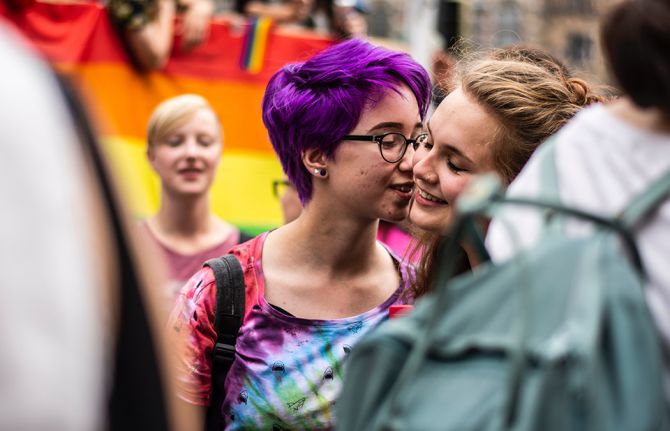

Press Release
UNAIDS and the LGBT Foundation launch groundbreaking study on happiness, sex and quality of life for LGBTI people
14 May 2019 14 May 2019New global survey aims to fill the data gap on the mental well-being of lesbian, gay, bisexual, transgender and intersex (LGBTI) people to create better conditions and improve health
GENEVA, 14 May 2019—UNAIDS and the LGBT Foundation have launched an online survey to evaluate happiness, sex and quality of life for LGBTI people. The survey, the first of its kind, is part of a campaign to gain more information and insight into the challenges faced by LGBTI people. The data gathered will help to voice the concerns and advocate for improving the conditions and treatment of LGBTI people, including ensuring access to inclusive health and social services.
“Many lesbian, gay, bisexual, transgender and intersex (LGBTI) people face stigma and discrimination daily in education, work, health and social settings. We want to understand how this affects wellness, including mental well-being, and also their responses and resiliencies,” said Gunilla Carlsson, UNAIDS Executive Director, a.i. “By examining in depth how economic, socioecological, homophobic and other variables impact the lives of LGBTI people, we will be able to advocate more strongly for meaningful change to improve their lives.”
LGBTI people have to contend with stigma and discrimination and are often faced with a lack of economic opportunities and a lack of access to health and social care. They are also at much higher risk of HIV infection. Estimates show that the risk of acquiring HIV is 27 times higher among gay men and other men who have sex with men and 13 times higher among transgender people, yet studies show that many gay men and other men who have sex with men and transgender people avoid seeking health services for fear of stigma and discrimination.
Although there are studies that evaluate the well-being of LGBTI people through measuring levels of violence, legal status and health―often HIV risk and status―few look at the mental well-being of LGBTI people, which is essential to ensuring their overall health and access to economic opportunities.
Data are also lacking on LGBTI people in Africa, Asia and Latin America, which the survey hopes to address. Available in more than 17 languages, the survey has been distributed through social media to more than 25 million people around the world and will run until the end of July 2019.
“We want progress in lesbian, gay, bisexual, transgender and intersex (LGBTI) health and well-being. We want it now and this survey will help in this direction. It is a great initiative, where LGBTI people can confidentially speak up and build the knowledge to empower, raise public awareness and advocate, with an ultimate goal of eliminating stigma and discrimination against LGBTI people. It will be extremely helpful to the community,” said Sean Howell, Chief Executive Officer of the LGBT Foundation.
The survey was developed in collaboration with Aix-Marseille University and the University of Minnesota and was designed in collaboration with representatives of the LGBTI community, including people living with HIV. To ensure the highest standards with respect to privacy and the protection of personal data, the survey complies with the General Data Protection Regulation.
To secure and safeguard anonymity, access is provided via a secured weblink, which establishes an encrypted link between a web server and a browser. The research protocol for the survey has been approved by the Research Board of Ethics of Aix-Marseille University and by the Research Ethics Review Committee of the World Health Organization.
The survey is open for participation until 31 July 2019 and takes about 12 minutes to complete.
To participate in this groundbreaking survey, click on the following link: https://www.research.net/r/LGBTHappinessResearch.
UNAIDS
The Joint United Nations Programme on HIV/AIDS (UNAIDS) leads and inspires the world to achieve its shared vision of zero new HIV infections, zero discrimination and zero AIDS-related deaths. UNAIDS unites the efforts of 11 UN organizations—UNHCR, UNICEF, WFP, UNDP, UNFPA, UNODC, UN Women, ILO, UNESCO, WHO and the World Bank—and works closely with global and national partners towards ending the AIDS epidemic by 2030 as part of the Sustainable Development Goals. Learn more at unaids.org and connect with us on Facebook, Twitter, Instagram and YouTube.
Contact
UNAIDS GenevaSophie Barton-Knott
tel. +41 22 791 1697
bartonknotts@unaids.org
UNAIDS Media
tel. +41 22 791 4237
communications@unaids.org
Participate
Press centre
Download the printable version (PDF)
